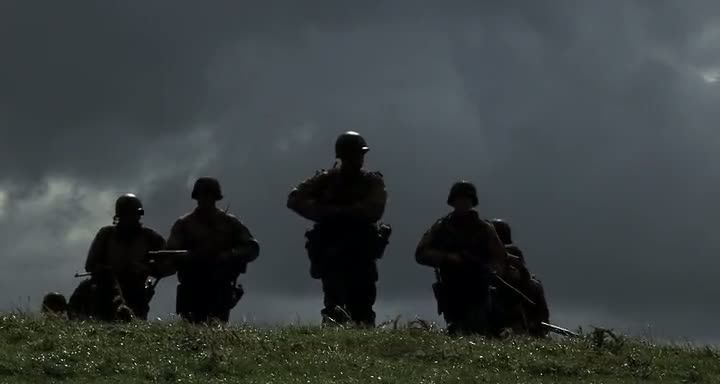
It has been said that all war movies are ultimately anti-war. The implication is that it is impossible to show the reality of war — the death and destruction, the dismemberment, the endless struggle over just one more patch of land like any other — without showing its horror, brutality and pointlessness. It has also been said, however, that no war movie can ever truly or completely be anti-war. By the nature of the war movie genre, it is inevitable that these films will be exciting and visceral, that they will show the bravery and honor of the soldiers, who are always at their bravest precisely when they are delivering grand, solemn speeches about how they're not brave. If Steven Spielberg's Saving Private Ryan proves the truth of one of these axioms, it is the latter rather than the former. Spielberg's film is all about the honor of war, the bravery of the soldiers. Saving Private Ryan has often been praised for its realism, for its truthfulness to the experience of war, but Spielberg's idea of realism is hiring real amputees to play soldiers who get their limbs blown off. It's shallow realism, a thin coating of the real over a foundation of Hollywood contrivances and rote recitations of familiar ideas.
The script (by Robert Rodat) makes repeated use of the words of Abraham Lincoln's letter to the widow Bixby, who lost five sons in battle during the Civil War, the key words of which refer to those who offer their lives as a "sacrifice upon the altar of freedom." (There's a metaphor for Spielberg's "realism" here, since history has shown that the letter was mistaken, and at least three of those sons didn't die in combat.) This letter is read early on in the film by a general upon learning that three brothers have died within a week of one another during the invasion of Normandy, during World War II. A fourth brother, James Ryan (Matt Damon), has air-dropped into a chaotic region, his location and status unknown. The film bears the name of this Private Ryan, and it's this man, who remains offscreen for much of the film, who serves as the focus of the subsequent action. Later, the words of the Bixby letter are repeated in voiceover, and again they seem like brazen manipulation, an unthinking regurgitation of grand words with a grand name to somehow legitimize them.
Such sentimentality is at odds with the battle scenes, in which Spielberg tries to be unstinting in his depiction of the horrors of war. The celebrated opening (which kicks in after a lame and thoroughly Spielbergian framing device) is a nearly half-hour re-enactment of the invasion of Normandy, a bloody and relentless sequence. The opening minutes of this sequence are especially striking: as the troop boats drift towards the shore, Spielberg shows the men inside the boats, praying and muttering to themselves, throwing up, shaking with fear. And then the boats arrive at the beach, and the gangway at the front lowers to allow the soldiers to charge off... and the enemy machine guns open fire, cutting down whole ranks of soldiers where they stand, before they have a chance to take so much as a step forward. Within seconds, a whole boat's worth of men has fallen, each line collapsing riddled with bullets, clearing the path for the next men behind them to be shot as well. It's horrifying, this devastating slaughter, and the rest of the sequence only intensifies the sensation of being surrounded by death. It's loud and visceral. Limbs fly, the bottom half of a man's body disappears into an impact crater, blood spurts, bullets ping off metal, medics struggle to staunch the flow of blood from men who are soon dead, either from existing wounds or new ones, as bullets continue to fly. In one shot, Captain John Miller (Tom Hanks), dazed from an explosion, watches as a soldier with his arm blown off wanders aimlessly in a circle, stoops down, and stands back up holding his own detached arm before strolling away like a zombie.
This is powerful stuff. But the film's visceral feel for combat and death doesn't really carry over into the scenes after the battle of Normandy, when Miller's unit is tasked with the mission of locating the missing Private Ryan and bringing him back safely, so that his mother will not have to hear that her fourth and final son has also died in combat. Miller's men resent the mission, resent being asked to risk eight lives for the sake of one, and though Miller mostly tries to keep his reservations to himself, he too is unhappy with the job. He loves and cares for his own men and feels the pain of losing each one, but Ryan, as he says himself, means nothing to him. The bulk of the film consists of this small group's trek across a battle-fraught stretch of France where German and American troops square off in various ruined small towns.

When the soldiers aren't engaged in battle, Spielberg and the script mostly resort to war movie clichés, like one man's never-sent letter to his parents, taken after his death by another man in the unit and then passed from one man to the next as those carrying it are killed in action. Another man regrets a childhood unkindness to his mother. Another man is Jewish and never gets tired of shouting his religion at German soldiers. The home and pre-war occupation of the guarded, private Miller are the subject of a pool in his company, and of course at a key moment he must deliver a big (and unbearably maudlin) speech about what he did before the war. The action is realistic and visceral, but when the soldiers put down their guns there's nothing but obvious scriptwriters' devices and Hollywood speechifying, a reminder that for all the blood and missing limbs Spielberg displays onscreen, this is still just another in a long line of Hollywood war movies, and a rather traditional one at heart.
There is one cliché that Spielberg and Rodat go to great lengths to subvert, and that's the cliché of the cowardly or incompetent soldier who redeems himself at the last moment in a grand act of bravery. Corporal Upham (Jeremy Davies) is a translator and map-maker who has never seen combat, but who joins the unit because Miller needs someone who speaks both French and German. Upham cowers at the fringes of each battle, watching from the sidelines, but in the film's final battle, a desperate struggle to hold a bridge against German tanks and infantry, he's tasked with running back and forth among the American positions, carrying ammo where it's needed. At some point, his already modest courage utterly falls apart, and he can barely do more than whimper and cower in a corner, trying to hide from the Germans. There is a certain moment that seems to be building towards Upham's redemption, but that redemption never comes. The tension of the scene arises almost entirely from the way Spielberg cleverly sets up expectations for a very conventional resolution: one expects Upham to finally man up and come to the rescue, but it never happens. It's a bracing defiance of convention from a filmmaker who is usually conventional, and purposefully so, even at his finest moments. So it's worth noting that Spielberg defies the convention in order to reinforce another, solidifying Upham's status as the cowardly and ineffectual intellectual figure. He also ties this cowardice to one of the film's most laughable contrivances, the German soldier who Upham had earlier defended from summary execution, only for him to return at the climax, once again killing American soldiers. It's outrageous, especially since it winds up suggesting that Upham was wrong, earlier in the film, to oppose the summary execution of a surrendering enemy soldier. The film seems to be singularly lacking in the perspective that enemy soldiers are, like Miller and his men, mostly just ordinary men doing their duty for their country. Instead, Spielberg, with his blockbuster instincts, has to make this random German soldier the villain of the piece, and everything surrounding Upham and the German soldier is so irredeemably muddled that it's not really clear what, if anything, the film is trying to say about this situation.
Sometimes a movie that isn't very good can still be interesting. A movie that fails in a thousand ways can still capture the imagination, provoke thought, deliver startling insights. Spielberg's movie is the opposite. Saving Private Ryan is a "good movie" that's not that interesting, a well-made war picture with no particularly fresh or interesting insights, only confused messages and silly regurgitations of clichés and leftovers from countless other war movies. In isolated scenes it sometimes seems like a fine film, and at its best it's undoubtedly a great action movie. There are scenes here, moments of awful beauty, that must surely rank among the most powerful cinematic encapsulations of the wartime experience. The red waves washing up over the bodies of men and beached fish at the end of the battle of Normandy, bloody waves gently rolling into the shore, are haunting and unforgettable (though borrowed from Sam Fuller, a towering influence on this film). The film's non-battle scenes don't often rise to this level, though, and the film is torn between two modes, between stark realism and Hollywood artificiality, without ever quite settling on one or the other.








0Awesome Comments!